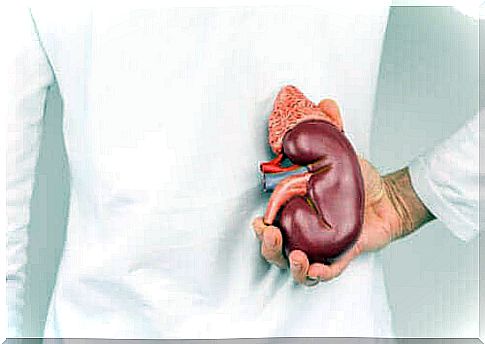Chronic Kidney Failure: Symptoms And Diagnosis

Chronic kidney failure leads to high blood pressure, fatigue, anemia and lack of appetite. Read on and find out what the symptoms are and how doctors diagnose it.
Chronic kidney failure is a gradual process in which these organs cease to function properly. You may already know how important they are. They filter the blood and excrete waste products through the urine.
As if that were not enough, they also perform tasks in terms of hormones, electrolytes and metabolism. So when the disease progresses and the kidneys irreversibly lose their abilities, the situation makes your life impossible if you do not get treatment started immediately.
The condition is usually asymptomatic in the beginning, so it can be difficult to arrive at a diagnosis. In today’s article, we will explain the symptoms that can show up and how a doctor would diagnose chronic kidney failure.
Symptoms of chronic renal failure
This disease manifests itself in many different ways and it is due, as we mentioned above, that the kidneys contribute to several bodily functions.
Anorexia is one of the most common symptoms and then there is nausea and vomiting. According to a study published in the Revista de Nefrologia, these signs are due to an increased amount of urea in the blood. Unfortunately, it can continue even after treatment and it increases the risk of malnutrition.
High blood pressure, fatigue and sleep problems are also common symptoms. There is a general accumulation of fluid when the kidneys stop functioning and this leads to shortness of breath, swollen legs and chest pain.

Lack of appetite, anemia and pain in the lower back are possible signs of incipient kidney failure.
Disturbances in the electrolytes
These changes are usually seen when the kidneys are already significantly damaged. The electrolytes that most often strike are baking soda, sodium and potassium. The potassium content in the blood tends to increase, leading to disturbances in the heart rhythm.
Baking soda is essential for regulating the body’s internal acidity. Metabolic acidosis occurs when there is an advanced chronic renal failure.
Cardiovascular symptoms of chronic renal failure
An article in Anales de Cirugia Cardiaca y Vascular concludes that kidney failure has the same risk factors as circulatory diseases : being older, smoking and dyslipidemia.
A high concentration of urea in the blood causes an acceleration of atherosclerosis. This disorder consists of the formation of cholesterol plaques in the blood vessels, which prevents a good blood flow. Therefore, among other things, there is a greater risk of ischemic heart disease and heart failure.
Hematological abnormalities
Anemia is one of the earliest symptoms of this disease. In fact , this symptom also gets worse as the chronic liver failure progresses. This is due to a lack of erythropoietin, a substance that is composed in the kidneys and stimulates the formation of red blood cells.
Disorders of bone and muscle in chronic renal failure
Renal osteodystrophy is a term that covers all the symptoms in bones that come with kidney disease. Deformities in certain bones, such as the fingers, and a higher tendency for bone fractures are common. In addition, pain in the bone tissue is often experienced in patients with this disorder.
Hormonal changes
Gender changes occur in both men and women. According to the Clinica de la Universidad de Navarra , women experience changes in menstruation, while men experience erection problems and a decrease in sperm count.
Skin problems
Chronic liver failure also leads to changes in the skin. In fact, these symptoms occur as a result of treatment with hemodialysis. For example, there may be itching, dryness and changes in the hair. Anemia can also cause pale skin.

Hemodialysis can lead to complications. Therefore, many symptoms stem from treatment.
Diagnosis of chronic renal failure
The symptoms appear when the disease is already advanced. Therefore, it is important to perform a series of tests, in order to diagnose the early signs of kidney failure.
First, doctors will probably take some blood tests that show the concentration of creatinine and urea. There are two indicators of how the kidneys work. There may also be a urine test to measure how much is excreted in a whole day.
Graphic tests such as ultrasound or MRI scan can also help in a diagnosis. The kidneys tend to become smaller and so does the amount of urine excreted. The doctor can measure this by studying pictures.
A complex disease
Chronic kidney failure is a complex disease that must be treated as effectively as possible, depending on the resources available. As a rule, hemodialysis is the technique one first chooses, but one must keep in mind that it affects many aspects of the body.
At the same time, smoking increases the risk posed by the disease and also the risk of both circulatory and kidney complications. Therefore, it is important to be aware of.
You should follow your nephrologist’s recommendations regarding care and access to treatment. This is because your quality of life depends on these indications, as well as that you adhere to a special diet plan and changes in your lifestyle.
We hope you enjoyed this article.









